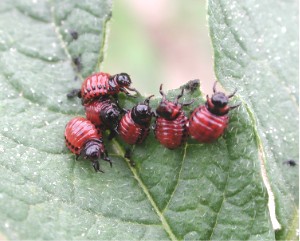If you have anything that stops your organic garden from yielding the best results, it is likely to be those pests that invade or surround your garden spot. Now, if you’re very determined in relation to controlling these pests and getting them out of your backyard for good, a number of resources is available so that you can be prepared and informed on the varied varieties of pests that could threaten your crop.
The difficult consideration about insect control is the fact that there are so many kinds of pests that might invade your garden patch; it will truly be rather a problem to remember them at once, so informing yourself well beforehand is really the only reliable way to gain enough knowledge on which pests to watch out for.
One of several most successful tactics of pest management is always to familiarize yourself with the more common bugs as well as critters. These enemies to the garden could really hinder the growth of your plants, but only if you let them.
The devices and implements utilized for battling plant pests are of two kinds:
(1) those which offer physical shelter to the crops;
(2) those which are applied to the plants and/or pests, in order to kill or else fend off the insects.
A mechanical device often used to shield brand new seedlings is a covered frame. It typically consists of a wooden box, approximately 18 inches to 2 feet square and roughly eight high, enclosed by glass, protective cloth, mosquito net or mosquito wire. The 1st 2 coverings hold, obviously, the additional advantage of retaining heat and shielding from chill, which makes it feasible through their use to sow earlier than could be otherwise safe. These are utilized widely to get an extra early and sound start for cucumbers, melons as well as other vine veggies. They can also keep away a large number of pests.
Here are a number of common garden pests, and some recommendations (both mechanical and otherwise) used for diminishing their impact without the usage of harmful chemicals:
 Image via WikipediaBeetles
Image via WikipediaBeetlesYou’ve got 2 options for beetles: manually eliminate them by hand or else spray them with insecticide which is poisonous to them. There are actually a number of natural pesticides on the store shelves at the present, which you may utilize to control these pests without damaging your family’s health (for some tips, visit our web page at http://www.newholisticliving.com/sustainablegardening.html).
If left untouched, beetles possess the capacity to bore scores of holes in your leaves and munch away on your plants over time, especially when their population expansion is unrestrained. The striped beetle eats tender melons and squash leaves. If you happen to notice your squash leaves riddled with holes, you could have striped beetles. They can be recognized by their dark colored bodies with gold stripes running end-to-end. Then again, beetles come in a variety of types, but the best remedy is normally one of these two approaches described above.
Aphids
You may often become aware of sticky communities of bugs in shades of scarlet or jade when you’ve got aphids in your garden. Fortunately, it is possible to simply remedy this via spraying with insecticidal soap or a comparable material. Aphids are probably common to just about every garden veggie one can possibly conceive of, therefore if you are growing veggies, you will be most likely to encounter these sticky organisms.
Cut Worms
If you observe crawling, dull caterpillars that are brown or gray in hue, then you may have discovered cutworms invading your garden!
 |
| Cutworm collar from toilet paper roll |
Garden Slugs
And also you have garden slugs, which can be awful and extremely harmful pests. The slug will demolish just about every garden plant, whether it’s a flower or perhaps a vegetable. These lay a great deal of eggs within old rubbish piles, or underneath dried vegetation. Slugs do more destruction in your garden than virtually every other single insect pest. They might be hard to spot, because they habitually take cover slightly below the surface of the soil during the day. However, in most cases, they are going to hide very close to the plant they’ve been eating, and therefore if you see indication of slug damage, try probing under the exterior of the mulch, or particularly when there are also fallen leaves nearby. If you find slugs, the most effective way we have discovered to remove them is a nifty little product called Sluggo. Sluggo is OMRI certified for organic gardening, and works by attracting the slugs with natural bait, and kills them by the use of iron phosphate, a mineral that’s not dangerous for animals and humans. (I had hundreds of little slugs eating my own garden last season until I found this gem, and it did the trick!)
In the concluding part of this short article series on organic pest management, we are going to go over one or two more frequent pests which can plague specific kinds of crops, so be sure check back for this in a few days!
Rose.
P.S. For more recommendations, resources, and information on organic gardening as well as managing garden pests naturally, you can visit http://www.newholisticliving.com/sustainablegardening.html.

No comments:
Post a Comment